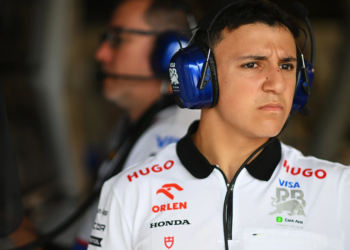The final laps of the season-ending Abu Dhabi Grand Prix were some of the most intense of the entire 2016 season, with race leader Lewis Hamilton running nine seconds slower during the closing laps of the race, compared to his pole time, in a bid to force team-mate and championship rival Nico Rosberg into the clutches of Sebastian Vettel and Max Verstappen.
The Briton’s aim was crystal clear – hope that Rosberg was either overtaken by both Vettel and Verstappen or taken out of the race trying to defend his position. Remember the German only needed to finish third to secure the championship crown, and fourth or lower would have given Hamilton his fourth title and third in succession.
Ultimately Hamilton was unsuccessful and neither of the above occurred, resulting in Rosberg crossing the line +0.439 seconds behind his team-mate to secure his maiden championship title and become only the second son of a world champion to become world champion himself.
Although Hamilton’s tactics, which some including Vettel viewed as ‘dirty’, failed to work, it provided us with a thoroughly enthralling end to the 2016 season. With the top four separated by only 1.6 seconds – the closest finish in the top four since the 2012 Monaco Grand Prix when Mark Webber led home a top four separated by just 1.3 seconds.
However, there was controversy brewing within the paddock after the race regarding Hamilton, who clearly decided to ignore team-orders issued to him during the latter stages of the race. The orders in question were asking the Briton to essentially speed up and stop backing Rosberg into the pack, to which his reply was simple: “I think you should let us race”.
The main question on the lips of many within the paddock immediately after the race was should such team-orders have been deployed by Mercedes? After all they had stipulated all season that they would allow their drivers to race, including the final race of the season in Abu Dhabi.
In defence of Mercedes, allowing their drivers to race without team-orders was something they were true to their word on throughout the majority of the season, after all Rosberg and Hamilton made contact on more than one occasion, leading to both embarrassingly retiring on the opening lap in Spain.
But were Hamilton and Rosberg actually “racing” in Abu Dhabi during those final laps? With Hamilton essentially crawling around and Vettel closing in on the duo at a phenomenal rate on his fresh set of supersoft tyres, it looked perfectly feasible at one stage that Mercedes’ victory could be compromised.
Therefore from a team’s perspective deploying such team-orders was fully justified. Remember, a team’s only aim in the sport is to win races and ideally with their other driver in second position. Imagine the embarrassment if Mercedes had lost the win to Vettel because Hamilton had driven too slowly on purpose. The words literally sound pathetic when spoken!
Admittedly some may say that the use of team-orders in a title decider is totally out of order, especially when the team in question has already wrapped up the constructors’ championship. But remember Mercedes mentioned before the race that they would treat the season finale no differently to the races throughout the year, and once again they were true to their word.
Let’s rewind to the Monaco Grand Prix back in May, when inclement weather conditions forced the drivers to start the race on full wet weather tyres before switching to dry tyres later on.
After starting the race behind the safety car, pole man Daniel Ricciardo scampered into the lead when the safety car returned to the pits, with Rosberg floundering around in second position by some 13 seconds during the early stages.
With Hamilton stuck in third position behind his team-mate, Mercedes issued a near-identical team order to Rosberg to the one issued to Hamilton in Abu Dhabi, asking him to pick up the pace before then ordering him to allow Hamilton through when it became clear Rosberg’s pace was showing no signs of improving.
From that moment onwards Rosberg’s afternoon failed to improve and the German continued to plummet down the order while team-mate Hamilton closed the gap to Ricciardo and eventually stole an imperative victory after Red Bull’s monumental foul-up in the pits.
After the race Rosberg admitted that being told to allow Hamilton through was a “painful experience” but he understood it from the team’s perspective. The German even went as far as stating that for the team Monaco was a success. Let’s all face it, Rosberg could’ve happily elected to ignore team-orders. After all he was leading the championship and had qualified ahead of his team-mate, not to mention they were only six races into a 21 race season.
Rosberg’s decision to adhere to team-orders without question makes Hamilton’s antics in Abu Dhabi seem all the more petulant, and makes any disappointment from Mercedes wholeheartedly understandable.
Some will look at Mercedes’ decision in Abu Dhabi as a clear act of favouritism, however there’s no denying that the German marque were simply acting no differently to how they had in a similar situation earlier in the year.
Immediately after the Abu Dhabi GP sensationalist reports emerged from national newspapers stating that Hamilton could be facing disciplinary action from within Mercedes, which could result in sanctions such as a race ban or even the sack!
Although Toto Wolff was extremely coy after the race on the direction the team would take in dealing with Hamilton’s misdemeanours, people must understand that Mercedes are a multi-national business and brand with thousands of employees. If a member of staff on the production line suddenly adopted Hamilton’s attitude he would more than likely find himself facing sanctions which would include dismissal.
Overall the thought of Hamilton receiving anything greater than a slap on the wrists is utterly ludicrous, but they must be seen to be dealing with any act of anarchy in the team even if they eventually let it slip under the radar. Let’s face it they now have two world champions on top of their game racing for them, which could prove pivotal next season when the sport reconvenes with new cars and new tyres.
In my honest opinion Hamilton’s actions in Abu Dhabi were to be fully expected, however when the team decided to issue their orders there should’ve been absolutely no ambiguity over following them.
Therefore in this instance Hamilton could be viewed to be both in the wrong and in the right. But he must remember that he is no bigger than the team around him, and that they will always ideally want their drivers to cross the line first and second, regardless of the order.
Admittedly we were treated to a thrilling final race, so as fans of the sport we can be thankful to Hamilton and his tactics, whether you think they were justified or not.
But the next time he finds himself in a position such as Monaco earlier in the year, we can all agree that both Mercedes and Rosberg would be forgiven for thinking twice about both issuing and obeying similar team-orders again.
After all, in Formula 1 you both win and lose as a team.






